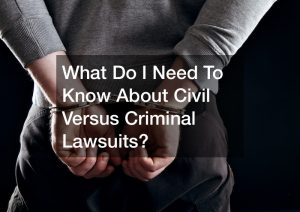

A civil lawsuit can sometimes be less stressful than a criminal one, and this is why you need to work with a good criminal lawyer if you end up getting charged for a crime. They should help you understand the process as well as the options that you have. They should also advise you, letting you know what might happen if, for instance, you get a new charge while out on bond. If you’d like to find out how to know if someone pressed charges against you or have questions such as “Does the complainant have to appear in court”? you need to ask your lawyer.

You could also do some research by reading up online to see what different sources have to say about these things. Remember to confirm with your lawyer about anything that you’re unsure about. This can help you avoid making the wrong call at any point. You may also find it easier to keep up with the whole process and know what’s happening every single step of the way. If you have a sensitive case, you can look for alternatives to hiring a lawyer. For instance, you can do some research to learn how to represent yourself in court for domestic violence. This may help you get a better outcome in your case.
The law has many branches, with criminal defense being just one of them. If you’re interested in learning about the key concept in criminal law and other details, you can simply search online for a summary. While doing this, you might come across a criminal law casebook that might inform you of criminal law and its processes.
The more you know about the process, the easier it might be for you to get a good outcome if you ever find yourself in a criminal case. You can find out some details by searching online for things such as “criminal conduct definition.” In the results, you’ll find a number of articles that can prove beneficial, but make sure that they’re legitimate. This will ensure that you don’t end up with false information that could leave you in a terrible spot to get out of.
If you’re ever in a criminal case, remember that it’s important for you to find a professional. This is crucial to do despite how much information you’ve managed to gather. That’s because they’ll have the benefit of experience with cases like yours and so they could give you a better outcome with less risk of losing.
The American legal system exists to protect our citizens; and in particular, long-term decisions can be finalized within its courts. But with that being said, Americans tend to associate the courts with criminal cases, in part because that is what dominates our news cycle. Furthermore, most fictional depictions of our courts focus on criminal cases as well. Certainly, it’s important that our criminal courts function as they should, as they remain the backbone of our legal systems. But beyond that, we need to consider the fact that there is another “type” of court that tends to get looked over quite often. Lots of people don’t truly understand civil litigation, let along how a civil vs criminal lawsuit works. This leaves us at a disadvantage, as much of the reason why civil lawsuits exist is so that we as individuals have the right to pursue justice beyond the criminal court system. Quite often, in fact, civil lawsuits occur after a criminal lawsuit has failed. Perhaps most famously, the O.J. Simpson case saw Simpson being acquitted in criminal court, while he lost the civil lawsuit brought against him by the same people that initially sought justice in that criminal court system.
Of course, this isn’t to say that civil court exists so that people can get another stab at a “conviction” following an acquittal in criminal court. Civil court is independent of criminal court, and it functions in its own unique way. This is why it’s important that you understand the difference between civil vs criminal lawsuits. The more you know about civil lawsuits, the more easily you will be able to defend yourself on an individual legal level.
What Is A Criminal Lawsuit?
Let’s begin with the type of lawsuit that you may be more familiar with; usually, this will be a criminal lawsuit. A criminal lawsuit essentially is going to involve felony and misdemeanor crimes, and will of course be handled by criminal law attorneys. Felony and misdemeanor crimes have specific penalties already attached to then, and in the case of criminal lawsuits, those punishments will usually come in the form of either fines or jail time. Ultimately, the stakes are usually somewhat higher in terms of a criminal lawsuit because it’s difficult to avoid a significant penalty if a decision is made against the defendant. But with respect to these higher stakes, there is a much greater burden of proof on the part of the prosecution during a criminal case. During a criminal case, guilt must be proven beyond a reasonable doubt. Otherwise, the case’s verdict could be called into question.
This is further supported by the fact that a criminal case is heard by a jury. A jury will then present their verdict to a judge, who will proceed to pass the sentence. The judge may or may not take the jury’s recommendation into account when choosing a sentence. If the death penalty is on the table, which is only the case when a serious crime like murder is in question, there may be a death penalty stage of the trial, which will occur after the individual is convicted. The jury will then hear the arguments for and against the death penalty for the convicted party. Now, not all criminal cases need to be heard before a jury. At times, defendants will have the ability to have their cases heard before a judge only. This is sometimes called a “bench” trial. Some defendants prefer to have their case heard solely by a judge because they feel that this would make an acquittal more likely; in this case, they would need to discuss it with their lawyers. At face value, it may seem that when it comes to civil vs criminal lawsuits, a criminal suit is more intimidating. But a civil lawsuit should not be dismissed.
How Does A Civil Lawsuit Work?
The next portion of the matter of a civil vs criminal lawsuit to consider is, of course, the matter of a civil suit. A civil lawsuit differs from a criminal case in a number of ways. For one thing, the penalties involved in civil lawsuits initially seem less severe; most of the time, the penalty comes in the form of monetary compensation. However, there is a level of individualism involved within each civil case, and therefore the court can decide a particular punishment, like paying an individual’s doctor’s bills or perhaps ceasing harassment of the plaintiff. Now, just as the defendant in a civil suit isn’t faced with jail time or a heavy fine, there also is a lesser burden of proof involved. Rather than reasonable doubt to consider, there is a “preponderance of evidence”. The lawyer involved essentially has to prove that the defendant is more likely than not to carry responsibility.
Now, at face value, the trial stage of a civil vs criminal lawsuit may not seem that different. It would involve a jury, just as a criminal trial would. The difference, however, is that a civil case will rarely reach the trial stage. Most of the time, the issue will be handle during settlement negotiations. For example, if an individual is attempting to work through a workers compensation civil case, they will likely have the issue resolved during settlement negotiations with their workers compensation lawyer. Speaking of lawyers, during a criminal case a defendant is guaranteed to have a lawyer no matter what; if the defendant cannot afford a lawyer, they will be provided one by state. There is no guarantee of a lawyer if you’re working through a civil lawsuit. If you cannot afford a lawyer, you may represent yourself. With that being said, representing yourself during any case, including a civil suit, is always risky. You may very well end up being at a major disadvantage, and much less likely to win your case. Fortunately, there are funding options to consider if you’re attempting to defend yourself in a civil case where you’re at a disadvantage. Depending on the type of case that you’re working on, you may find yourself eligible for certain charitable funds.
What Kinds Of Cases Are Considered Civil Lawsuits?

In general, we tend to have an idea of what felonies and misdemeanors are, and therefore what counts as a criminal case. But civil lawsuits can be much more confusing and difficult to navigate. Furthermore, the lower penalties involved in civil vs criminal lawsuits mean that many people simply don’t get that worried about civil lawsuits. But if you’re being sued for personal injury compensation, you’ll need to get much more informed very quickly. Generally speaking, a lot of civil cases are personal injury cases. And a personal injury case can quickly become more high stakes if the money involved grows. Generally speaking, a personal injury lawsuit will involve holding one party responsible for the injury of the other party. This could involve everything from medical malpractice to drunk driving. But certainly, there are many other types of personal injury cases, with the most common being auto accidents, medical malpractice, premises liability, product liability, and wrongful death claims. Furthermore, there are many different types of civil cases in general that need to be considered if one is comparing civil vs criminal lawsuits.
In terms of the most common types of civil cases that tend to be dealt with over time, they tend to be divided between several different classes. Among them are complaints against the city or federal government, which are typically settled out of the court systems. If the government refuses to settle, they can become full-blown civil case. Generally, these essentially involve the plaintiff alleging that the city or state is causing harm against the citizens. Class action cases, on the other hand, involve an entire group of people. These people are represented by the prosecution, and they are brought together by the fact that they’ve all been injured by the same party. Usually, these are the types of cases brought up by a faulty product being distributed to a large group of people, or those people otherwise being exposed to hazardous materials. A property dispute, on the other hand, is the kind of civil case that concerns property ownership and damages to an individual’s property or real estate. For example, these types of cases might involve landlord and tenant laws, if a landlord is attempting to hold a former tenant responsible for damages incurred while they were staying at a specific property. Another civil case type to consider involves torts. What is a tort? A tort is a case in which one party alleges that the other party caused them physical or emotional harm. These types of cases might involve assault and battery, or negligence, but there is a broad variety of issues that could fall under the realm of torts. Contract disputes are also included among common types of civil cases. A contract dispute will usually occur when one party cannot fulfill the obligations that they agreed to when they assigned a specific contract. Often, this occurs when a person signs a contract that has ambiguous terms or was written in a way that would make it debatable. One of the issues that makes civil cases most difficult to navigate, really, is that a civil case can be so broad. Many that find themselves as defendants in a civil case are completely caught off guard, which means that they need to begin researching before they choose an attorney to work with.
What Should I Know About Civil Lawsuits?

Clearly, there are a lot of quirks to consider when it comes to civil vs criminal lawsuits. For one thing, civil suits can be brought in both state and federal courts. You shouldn’t assume that if a civil case is being brought up, it won’t end up in federal court. Furthermore, a civil case may not necessarily end up crossing paths with a criminal case, but that is certainly not entirely out of the question. It can happen. For example, if a person was being pursued by an individual and their personal injury attorney following a drunk driving accident, they could still be pursued by the state on a criminal level. As previously mentioned, if a person is acquitted in a criminal case, they could still be pursued for damages in civil court.
Finding a lawyer can also be a bit more complex when you’re working on a civil case versus a criminal case. While you could very well depend on a public defender if you’re unable to afford an attorney during a criminal case, you’ll need to sift through a number of different lawyers when preparing for a civil lawsuit. It’s not enough to simply find an accident lawyer if you’re suing a person or entity following an incident that they might be responsible for. You’ll need to find a lawyer that specializes in the exact incident that you’re working with. For example, if you’re dealing with a traffic incident, you’ll want to find a lawyer that works with those types of cases. But if you’re dealing with a medical malpractice case, you need to find a good medical malpractice attorney. A good lawyer is the key to your civil case.
There is no such thing as an easy case; thinking that a case is simple, whether it’s a civil vs criminal lawsuit or not, is the type of mistake that will lead to you losing your case. You need to take it seriously no matter how straightforward that it seems, and a part of that is hiring the right lawyer who will fight for you.
At the same time, if your civil case ends up intersecting with criminal law, you shouldn’t feel defeated. Just as a civil vs criminal lawsuit isn’t necessarily simpler, a criminal case doesn’t isn’t necessarily insurmountable. You need to make these considerations when moving ahead with your case, no matter what kind of challenges you’re facing. You’ll be glad that you did when the time comes to have your day in court; whether it’s civil or criminal court.




